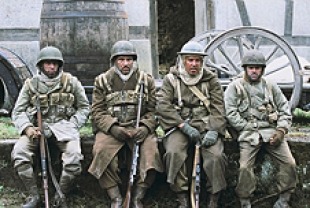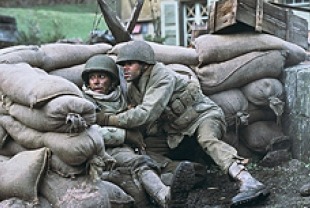In Edward Zwick's Glory, we saw how blacks fighting for the North in America's Civil War were poorly treated and abused. Rachid Bouchareb directs this World War II film which focuses on North Africans who fought for France and were routinely given short shrift. Not much time is spent tracing the backgrounds of the characters or even more importantly why they volunteer to serve the country ruling their own as colonizer. We do learn that Said (Jamel Debbouze) comes from a poor family and breaks his mother's heart by putting his life on the line. We can only surmise that others volunteered for service for the pay or the adventure.
The North African soldiers come under the command of Sergeant Martinez (Bernard Blancan), who speaks well of his men to his superiors but rarely mentions anything positive to them on a day-to-day basis. When his aide-de-camp is killed in the first serious military campaign in Italy, he chooses Said for the job, which is nothing more than being his servant. The two men from different worlds try to relate to each other, but when Said sees a picture of Martinez's mother and suggests that she could be the sister of his mother, his boss's racism flares up in ugly fashion.
Corporal Abdelkader (Sami Bouajila) distinguishes himself as a natural born leader but his ability to fire up his men over injustices against them makes it impossible for the French to promote him. In one incident, the North Africans are told they cannot have tomatoes for dinner whereas the French soldiers can, and they rebel. The commander listens to the Corporal's explanation of the upset and says everyone can eat the tomatoes.
As the war continues, so do other slights. Messaoud (Roschdy Zem) meets a French woman in Provence and spends a romantic evening with her. They promise to write but the French censor the North Africans' mail and throw his letters away. While in France, the men are treated to an entertainment which turns out to be a ballet. They are offended by seeing a woman so scantily dressed on the stage and storm out of the room. In another telling scene, the Germans drop pamphlets on a field saying that the North Africans should come over to their side and be free of oppression.
Colonel Abdelkader enlisted because he believed in French leader Charles DeGaulle's call to create a country where liberty, equality, and fraternity reigned. But as the war escalates, it becomes increasingly difficult for him to believe in this ideal, especially when his men are denied a leave to return home after fighting so fiercely. He takes his troops on a dangerous mission in Alsace believing that it will earn him a promotion and win his men the respect they deserve.
Days of Glory is a gritty war film that reveals that even courageous military service cannot erase the sharp edges of racism and bigotry.
Special features on the DVD include the making of and a short film The Colonial Friend.

